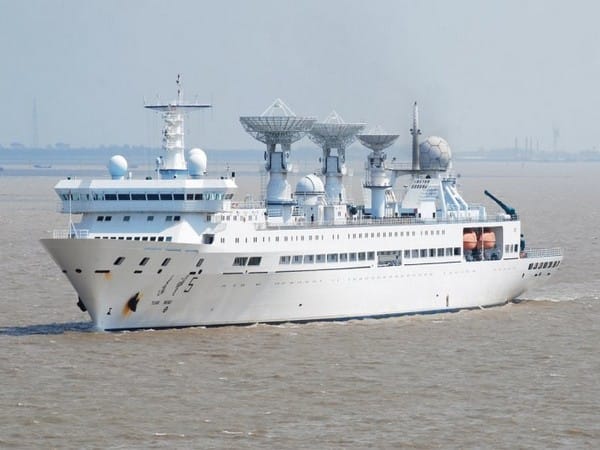Colombo [Sri Lanka], August 6 (ANI): Sri Lanka on Friday asked China to defer the visit of the spy ship Yuan Wang 5 at Hambantota.
The Ministry of Foreign Affairs of Sri Lanka requested China to defer the arrival date of the satellite tracker military ship Yuan Wang 5 until further consultations are made on this issue.
“The Ministry wishes to request that the arrival date of the vessel Yuan Wang 5 in Hambantota be deferred until further consultations are made on this matter,” read the MoFA letter referred to the Embassy of the People’s Republic of China of Sri Lanka.
The Chinese vessel Yuan Wang 5 was scheduled to dock at Chinese leased Hambantota port on August 11 for refuelling and leave on August 17.
“The Chinese scientific research vessel ‘Yuan Wang 5’ will enter Hambantota port on August 11 for a week. It is expected to leave on August 17 after replenishment. It could conduct satellite control and research tracking in the northwestern part of the Indian Ocean region,” said Y Ranaraja, Director, Belt & Road Initiative Sri Lanka (BRISL).
Designated as a research stroke survey vessel, Yuan Wang 5 was built in 2007 and has a carrying capacity of 11,000 tonnes. The survey vessel departed from Jiangyin, China on July 13 and is currently sailing close to Taiwan where China is conducting live-fire drills as an aggressive posture against Taipei for allowing US House Speaker Nancy Pelosi to visit the self-ruled island.
During this significant visit to the key Sri Lankan port, it could conduct satellite research in the northwestern part of the Indian Ocean region, prompting security concerns for India.
Hambantota port, located around 250 km from Colombo was built with high-interest Chinese loans. The Sri Lankan government struggled to repay the debt they had taken from China following which the port was handed over to the Chinese on a 99-year lease.
Notably, India had expressed its security concerns over the docking of the vessel at Hambantota as it was shown as a research vessel while the spy ship can map the ocean bed which is critical to anti-submarine operations of the Chinese Navy.
Since the beginning of 2022, Sri Lanka has experienced an escalating economic crisis and the government has defaulted on its foreign loans. The United Nations warned that 5.7 million people “require immediate humanitarian assistance.”
With many Sri Lankans experiencing extreme shortages of essentials including food and fuel, peaceful protests began in March. The protests led then-Prime Minister Mahinda Rajapaksa to resign on May 9, and his brother, President Gotabaya Rajapaksa, to flee the country on July 13 and resign the following day.
Wickremasinghe became acting president, and parliament elected him as the new president on July 20 with the support of the Rajapaksas’ political party, the Sri Lanka Podujana Peramuna.
Meanwhile, India under its ‘Neighbourhood First’ policy, has always come forward to help the debt-ridden island country. Recently, India has extended 8 Lines of Credit (LOCs) to Sri Lanka amounting to USD 1,850.64 million in the past 10 years.
“Government of India has extended 8 Lines of Credit (LOCs) to Sri Lanka amounting to USD 1,850.64 million in sectors including railways, infrastructure, defence, renewable energy, petroleum and fertilizers in the past 10 years,” External Affairs Minister S Jaishankar said in a written reply to question put by DMK Lok Sabha MP S Ramalingam.
“In January 2022, India extended a USD 400 million currency swap to Sri Lanka under the SAARC Framework and deferred successive Asian Clearing Union (A.C.U.) settlements till July 6, 2022. A Line of Credit of USD 500 million was extended to Sri Lanka for importing fuel from India,” the minister added.
More than 25 tons of drugs and medical supplies which were donated by the government and people of India during the last two months are valued at close to SLR 370 million. This is in addition to the economic assistance of around USD 3.5 billion and supply of other humanitarian supplies such as rice, milk powder, and kerosene.
These humanitarian supplies are in continuation of the government of India’s ongoing support to the people of Sri Lanka in multiple forms such as financial assistance, forex support, material supply, and many more. These efforts prove that Prime Minister Narendra Modi’s ‘Neighborhood First’ policy which places people-to-people engagement is still active.
India is becoming a stronger and more mutually beneficial partner to Sri Lanka. Apart from assistance during the pandemic and fertilizer chaos, India is also donating basic products to the island nation. (ANI)
This report is auto-generated from ANI news service. ThePrint holds no responsibility for its content.






